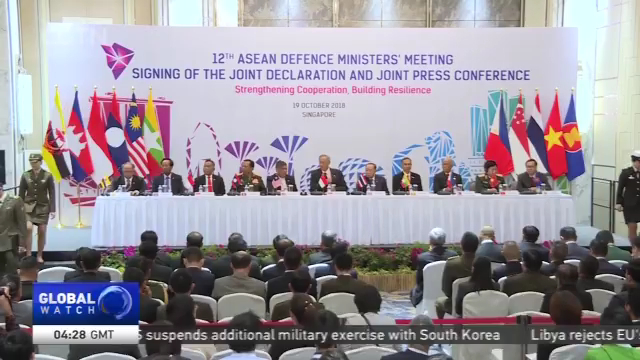
14:24, 20-Oct-2018
South China Sea: ASEAN adopts world's first multilateral air guidelines
Updated
14:00, 23-Oct-2018
02:24

A joint declaration adopting air guidelines for military encounters has been signed at the ASEAN defense ministers meeting in Singapore. The move has implications for activity in the South China Sea. The defense chiefs also reaffirmed their commitment to tackling terrorism and sharing intelligence in the region. CGTN's Miro Lu with the details.
In a significant move, ASEAN nations have adopted the world's first multilateral guidelines on engagement between military planes. Referred to as the 'Guidelines For Air Military Encounters', the agreement is designed to reduce risk of miscalculations and de-escalate tensions over contested areas such as the South China Sea.
Speaking at the press conference after signing the joint declaration at the 12th ASEAN defence ministers meeting, Singaporean Defence Minister Ng Eng Hen said such a code will reduce the risk of incidents and build confidence among various parties.
NG ENG HEN SINGAPOREAN DEFENSE MINISTER "It is significant that we have unanimous agreement on the guidelines, It is slightly more difficult at sea because the encounters are in terms of time and space far more complex, do they guarantee that – no encounter will take place, no, but without them encounters would get worse, at least they provide some protection."
The air guidelines are created on the lines of the Code for Unplanned Encounters at Sea which was adopted at last year's ADMM-Plus. A recent near-miss encounter between US and Chinese warships in the South China Sea has raised questions over the effectiveness of a non-binding code, but analysts say these voluntary and mutually accepted guidelines are still important.
NICHOLAS FANG DIRECTOR FOR SECURITY AND GLOBAL AFFAIRS SINGAPORE INSTITUTE OF INTERNATIONAL AFFAIRS "It's an important first step in ensuring greater safety and security of the various assets that are moving around in the sky among the ASEAN nations and hopefully tomorrow once the ADMM plus nations come on board as well. It makes the agreement much more robust."
The Defence chiefs also agreed to enhance intelligence-sharing initiative and reaffirmed their focus on strengthening regional counter-terrorism cooperation, along with establishing a network against chemical, biological and radiological threats. Miro Lu, CGTN, Singapore.

SITEMAP
Copyright © 2018 CGTN. Beijing ICP prepared NO.16065310-3
Copyright © 2018 CGTN. Beijing ICP prepared NO.16065310-3